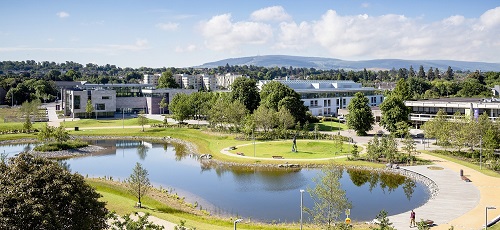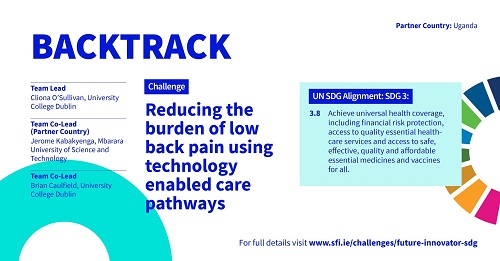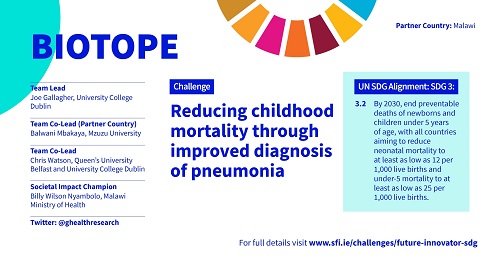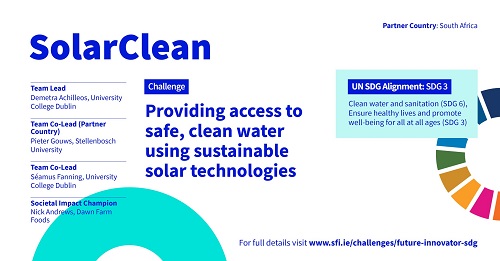
Three University College Dublin Research Teams Shortlisted for the SFI SDG Challenge
- Seven research teams awarded a total of €2.47 million in funding to develop solutions to address UN Sustainable Development Goals
Minister for Further and Higher Education, Research, Innovation and Science, Simon Harris, TD, and Minister for Overseas Aid and Diaspora, Colm Brophy TD today announced the seven research teams, including three University College Dublin (UCD) teams, selected to compete in the Science Foundation Ireland (SFI) SDG Challenge.
The challenge, run in partnership between SFI and Irish Aid, will see the seven shortlisted teams receiving funding of €2.47 million to develop innovative solutions in a variety of areas including improving surgical training using data science, treatments for vision loss and retinal diseases, care pathways for back pain, diagnosis of pneumonia and sepsis, as well as addressing water sanitation and pollution.
The seven teams will compete for an overall prize of €1 million to further advance their solution toward deployment. The focus of the SDG Challenge is for the development of innovative solutions that contribute to improved health and well-being, with a specific objective of addressing challenges in countries where Irish Aid works.
The projects represent international collaborations between research institutes in Ireland and those in Irish Aid partner countries: Malawi, Uganda, South Africa, and Vietnam.
The three successful UCD research teams are Backtrack, Biotope and SolarClean.
Backtrack is focused on reducing the burden of low back pain using technology enabled care pathways. The team lead is Associate Professor Cliona O'Sullivan, UCD School of Public Health, Physiotherapy and Sports Science with co-leads, Dr Jerome Kabakyenga, Mbarara University of Science and Technology, Uganda and Professor Brian Caulfield, UCD School of Public Health, Physiotherapy and Sports Science.

Biotope is focused on reducing childhood mortality through improved diagnosis of pneumonia. The team lead is Dr Joseph Gallagher, UCD School of Medicine with co-leads, Dr Balwani Mbakaya, Mzuzu University, Malawi and Dr Chris Watson, UCD School of Medicine and Queen’s University Belfast and societal champion, Billy Wilson Nyambolo, Malawi Ministry of Health.

SolarClean which is focused on providing access to safe, clean water using sustainable solar technologies. The team lead is Dr Demetra Achilleos, UCD School of Chemistry with team co-leads, Professor Pieter Gouws, Stellenbosch University, South Africa and Professor Séamus Fanning, UCD School of Public Health, Physiotherapy and Sports Science and societal champion Nick Andrews, Dawn Farm Foods.

Minister for Further and Higher Education, Research, Innovation and Science, Simon Harris, TD said, “I am delighted to announce the seven teams who will go on to compete as part of the SDG Challenge. SFI’s Challenge Funding Programmes seek to support Ireland’s best and brightest, to develop novel, potentially disruptive, technologies to address significant societal challenges.”
“Today it is about addressing development challenges under the UN SDGs in Irish Aid’s partner countries. The role of SFI, with the support of my department, in running challenge-based funding programmes that bring all of this together to have real world impacts, provides confidence in the future of scientific research.”
Professor Philip Nolan, Director General, Science Foundation Ireland said, “Each of the seven teams have worked incredibly hard and I would like to commend them on their dedication, and to wish them every success. Enabling talented teams to address significant national and global challenges is crucial, which is why challenge-based research funding is of high strategic importance to Ireland.”
“Having this level of talent compete in the SDG Challenge bodes well for the future of scientific research and I look forward to seeing the different solutions that develop throughout the programme.”
The SDG Challenge calls on research teams to develop innovative solutions to challenges associated health and well-being, including infectious diseases, non-communicable diseases, health systems strengthening, maternal and child health, sexual and reproductive health, and mental health.
Minister for Overseas Aid and Diaspora, Colm Brophy TD, said, “Millions of lives are saved each year as a result of scientific discovery. We have each experienced the benefits, as innovation and research helped us in our fight against Covid-19. That of course built on the knowledge gained by scientists in their live-saving research into HIV, malaria, TB and other viruses.”
“I am excited by this year’s SDG Challenge funding, which will support researchers in both Ireland and Irish Aid partner countries to develop new technologies to help people live healthier lives. I look forward to the work of the seven teams announced today, each cutting edge scientific research projects, making a real difference and wish each of the teams the best of luck.”
The SDG Challenge also supports solutions in related areas such as malnutrition, water sanitation, education and sustainable cities and consumption, where a clear impact on health and well-being can be demonstrated.
ENDS
11 April 2022
For further information contact Micéal Whelan, Communications and Media Relations Manager, UCD Research and Innovation, NovaUCD, e: miceal.whelan@ucd.ie
Editors Notes
Science Foundation Ireland is the national foundation for investment in research in the areas of science, technology, engineering, and mathematics, which assists in the development and competitiveness of industry, enterprise and employment in Ireland. www.sfi.ie
Further information on the Science Foundation Ireland SDG Challenge available via https://www.sfi.ie/funding/funding-calls/future-innovator-sdg/
